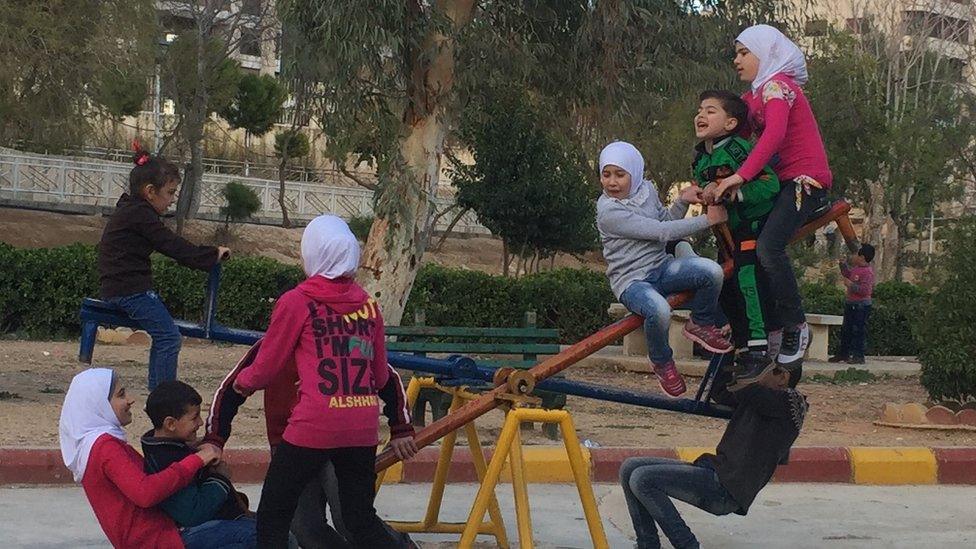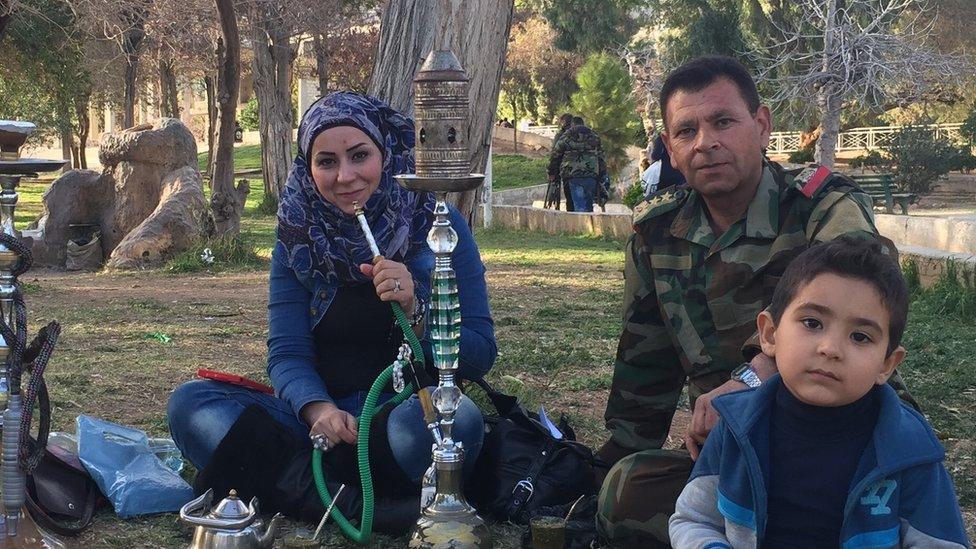Syria conflict: Spring truce brings calm, but for how long?
- Published
As Lyse Doucet reports, the truce has enabled aid to reach some areas for the first time in two years
Even the harshest of winters eventually end, as do the most punishing of wars. And this year, spring's arrival in Syria coincides with the quietest spell for a long time in this conflict.
But after five years of unparalleled protest and pain, most Syrians don't dare to believe that the fledgling truce here, now in its second week, will last.
"We hope and we pray," says Ruba when we meet in a park in Damascus, where fruit trees are in pink blossom and families are picnicking in warm spring sunshine.
"We used to think that after one year, it would be over, then after two years, but we're waiting, waiting, waiting."
No one expected this war would last so long and cost so much.
In the park, you can hear the whoosh of skipping ropes and roller skates. Ruba's friend, displaced from a war-torn suburb, wobbles past with a big brave smile, balancing precariously on her son's hoverboard.
Soundtrack of Damascus
This is not quite a truce, it is a cessation of hostilities. Largely brokered by Moscow and Washington, it is partial and imperfect, fragile and possibly fleeting. But never has there been such significant and sustained pressure from all the outside players - 17 in all - on Syria's warring factions.
Largely gone is what has long been the soundtrack of Damascus: the rumble of government warplanes across city skies heading for opposition strongholds; the distant thump of artillery; the thud of mortars fired into the city.

The sound of children playing has returned to the parks of Damascus
In rebel-held areas, just kilometres away but a world apart, the respite is even greater.
Safe for now from devastating air strikes and shelling, crowds surged through the streets last Friday in a show of strength which hasn't been seen for years. Videos posted on social media showed Syrians turning out, in their thousands, in opposition areas across the country.
Even in places which witnessed some of the worst of the fighting, defiance is undiminished. The protesters call for President Bashar al-Assad to go, just as they did when uprising began five years ago.
But the fighting continues on some strategic frontlines, including the embattled city of Aleppo. Not a day passes without violations being reported.
There were even two airstrikes just east of Damascus which allowed the government to advance a bit further into a strategic belt of farmland. And UN-designated terrorist groups including the so-called Islamic State and al-Qaeda affiliate Nusra Front aren't part of this deal.
Rebels or terrorists?
"We want this truce to work, " a senior Syrian military officer says. "Syrians worry their country could be divided." But attempts to clarify exactly which opposition forces fall under the rubric of terrorist groups quickly gets bogged down in definitions.
"This war will end when the West stops backing terrorists," the officer says. That includes "moderate terrorists", he adds.
His comments underscore a fundamental dispute at the heart of the process - which groups are legitimate targets of attack, and which are not because they are expected to be part of any future negotiations.
Syria, and its powerful Russian ally, are both accused of attacking some of the very groups that the opposition, with its Western and Arab backers, include in their delegations.
"We made a decision to remain quiet because if we break the truce, the blame will be put on our side," said a spokesman for the opposition's High Negotiations Committee Salem al-Meslet, in a telephone call shortly after the truce began. "We had difficulties convincing our people to commit," he added.

A Syrian family relax in a park in Damascus
However fragile, this truce is beginning to make a difference where it matters - some of nearly half a million Syrians trapped in areas under siege are finally receiving desperately-needed food and medicine.
"In the first part of 2015, we were able to reach 0% of these areas with aid," Yacoub El Hillo, the UN's humanitarian coordinator in Syria, says. "In the first part of this year we've reached 30%."
The hard part
But every delivery is painstakingly slow. A convoy last Friday into three rebel-held towns in East Ghouta just outside Damascus took days of negotiations, including phone calls to Saudi Arabia, the main backer of the most powerful rebel group, and to other allies.
And some medical supplies are still being taken off convoys heading into areas under siege or hard to reach.
"If you can't allow vaccines for children under five years old and can't allow medical supplies, even if it's surgical equipment or trauma kits used to treat people, not just fighters, then it's difficult to imagine that parties to this conflict will agree on many bigger existential issues in the political process," says Mr El Hillo.
And that's the point. Many involved in this war still believe they can prevail militarily.
"We're starting with the easy part - saving lives - and we want to build on that," Mr El Hillo says.
In Syria, that is hard enough. The rest is even harder.